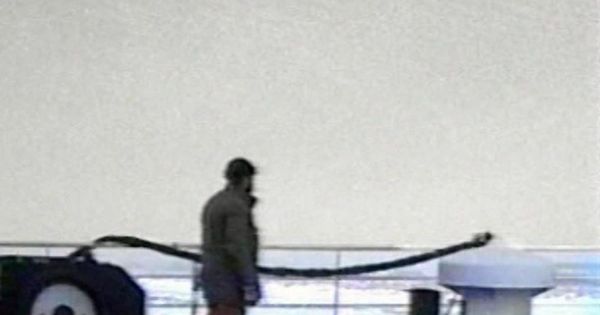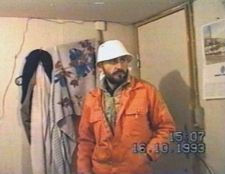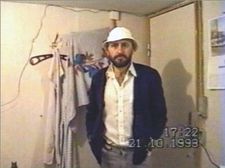 |
| Vikingland |
How did you find the footage in the first place? And what was the process whereby you decided that there was enough material for a film?
XC: I found the material under the TV in my house when I was changing the VHS machine for a DVD player. I started to clean and there were three tapes that had the name Vikingland on them. I was on the point of throwing them away but decided to take a look at their contents and it was a total surprise. So that's why I say that Vikingland is made from a miracle, that the images were on the point of being lost, the facts that they document forgotten, and something erased definitively from history.
Was it easy to find Luis Lomba once you had seen the footage?
 |
| Xurxo Chirro: "The truth is that the contents were very close to me and I wanted to make the film out of pure selfishness, for me" |
Was Moby Dick always the starting point for the structure of the film?
XC: I get asked this a lot. Consider that I didn't film the images. I couldn't be influenced by directors even though I recognised in the images some similarities with Lumière, Méliès, Ford, Benning, Lockhart, Hutton ... What influenced me when handling the material was the literature of maritime travel from the 19th century, especially Conrad and Melville. But the novel par excellence of this kind - and world literature - is Moby Dick, which is immense. And yes, it was decisive. In the first versions [of the film] there were sections of Luis reading the novel in the intertitles, but in the end I removed it. But the structure is in chapters, the fear of the white, the focus on Luis as if he were a new Ismael, the psychological evolution dominated by fatigue and adverse nature, and especially the end when he says that "Why then here does any one step forth? - Because one did survive the wreck".
The footage was filmed between 1993 and 1994. Was that a period of pronounced emigration from Galicia/Spain? I ask because, obviously, part of the film relates to the effort required to maintain your cultural identity when you have to work abroad - something that clearly resonates today. Was that part of your interest, to see how you could make a connection to the present?
XC: Yes, that's another interesting aspect of the film. Almost everything happens on a ship, in a clearly defined space and time, but the film deals with something as universal as work and the absence of work. And that's when your head can take you to the strong waves of emigration of the past, or the fence in Melilla [the Spanish city on the north-west African coast, representing the border between Morocco and Spain], or the sinister crossings towards Lampedusa. The film evolves from the uncertainty of the interior towards the exterior, where one sees your impotence in fighting a hostile nature. A group of men who are not from that territory struggle against adversity in order to survive and return home. The emotional charge is important, what we Galician and Portuguese call 'saudade' [nostalgia].
 |
| Xurxo Chirro: "The film evolves from the uncertainty of the interior towards the exterior, where one sees your impotence in fighting a hostile nature" |
XC: No, it's not chronological. I love that people realise this and are capable of simultaneously following the images and the date and timestamps. It's another way in which to think about the manipulation of images and the essence of cinema. At first I was interested in a kind of dramatic evolution marked by fatigue and by the evolution of the harshness of winter. The film has a very classical structure: beginning, middle and end. I wanted to get to the point where the viewer knew how to read what Luis is feeling in the last shot of the film. But yes, as you say, the fragile nature of the images and sound told me what to do.
For example, when the silence comes it is because the sound was completely broken and could not be reconstructed so [at that point] the images illustrate where the ice is the absolute protagonist of the screen. The material showed me what to do. The second part focuses on the experience of being embarked, the time, the routines, and in these passages the images were badly damaged, not by post-production but the passing of time. There are times when the film breaks, it pixelates, it cuts out...It's like an illustration of the moment when I discovered the images - what we are seeing is seen miraculously, we see what everyone had given up for lost. At this point the experimentation is greater, [and] the viewer becomes aware of the fragility and imperfection of video in comparison to HD. This technological evolution works as a metaphor for history where what happened to these men does not count for the 'History' written in capital letters.
Vikingland is screening in Scotland as part of the "Focus on Galicia" section at Iberodocs. Towards the end of last year, the magazine "Luzes" ['Lights' in Galician] celebrated 25 years of Galician cinema - and Vikingland came top in its survey of Galician films - but the New Galician Cinema has been especially concentrated in the last few years (at least in terms of its visibility outside Spain). What were the circumstances of this 'new wave' in the region? Is it connected to the resurgence of the so-called 'Other Spanish Cinema', or something very specifically regional?
XC: This question pleases me because very few people ask about what the Novo Cinema Galego [New Galician Cinema] consists of. Everyone takes the Darwinian perspective from the History of Art that a movement has to share themes and style. The New Galician Cinema filmmakers share: cinephilia, small crews, the democratisation of technology, self-management, risk, experimentation, improvisation, process, meta-language, referentiality, landscape, pantheism, irony, humour. But this phenomenon also has to be seen with a Marxist perspective where, thanks to an audiovisual policy that was unique in the world, (economic) resources for the production of films were set out but with the novelty that the money could be obtained by the creators themselves and not, as is usual, only by the producers.
 |
| Xurxo Chirro: "Technological evolution works as a metaphor for history where what happened to these men does not count for the 'History' written in capital letters" |
The scheme was the same as in the new cinemas in the 60s and 70s in Europe. All of the filmmakers from [the New Galician Cinema] era know each other, collaborate with each other, work on joint projects, lend each other equipment, party together... With the 'Other Cinema Spanish' we share contexts and circumstances but not much else, there are not such close personal ties despite it currently appearing like that. The Other Spanish Cinema is like an archipelago where filmmakers and focuses rose up in isolation. Probably the New Galician Cinema was the largest and most paradigmatic island. And I say that in the past tense because the different agents of the Galician and Spanish cinematographic institutions did little to maintain and enhance these distinctive features.
Vikingland was made in 2011 and you've since filmed Une histoire seule (2014), which has also screened at various international film festivals. What are you working on now?
XC: The truth is that the outlook in Galicia is very bad and an opportunity has not presented itself to me. The Galician misfortune came true and, as my father did, I had to emigrate. Vikingland "again". Une histoire seule collects much of my disappointment about the world and about cinema. It's now a lot more complicated to make projects come together. Those which materialise will be even smaller and more fragile. But the imperfect cinema is the most interesting cinema that you can currently make.
Translation from Spanish by Rebecca Naughten





















